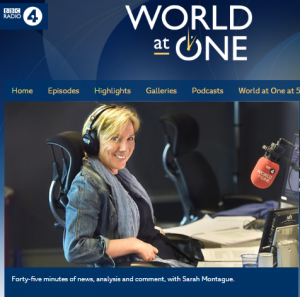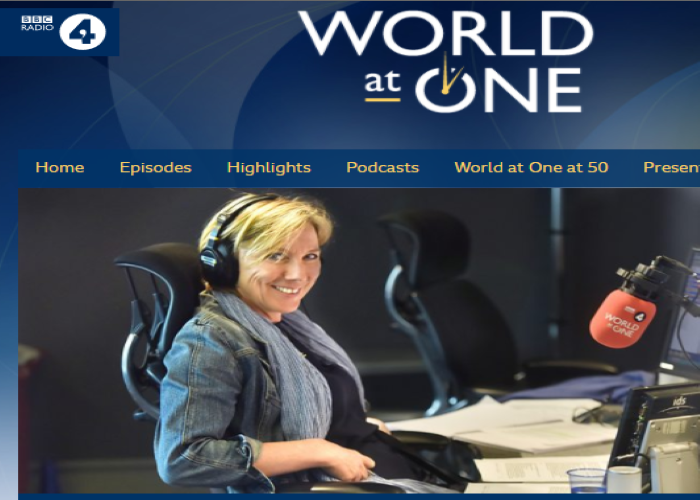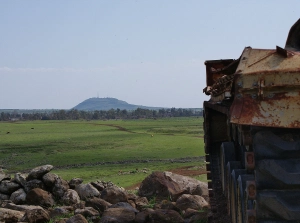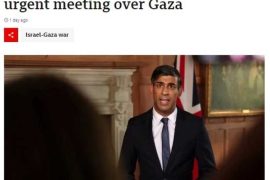h/t SFoI, MD
BBC exploitation of the topic of vaccinations against Covid-19 in order to promote a political campaign which claims that Israel has an obligation to provide vaccinations to Palestinians even before it finishes inoculating its own citizens continued this week.
On January 17th viewers watching the BBC News channel saw unnecessary use of the phrase “appears to be” and a context-free reference to “criticism”:
“So how does the UK’s progress on vaccination compare to the rest of the world? Well Israel appears to be leading the way with 25 doses given per 100 people, although it has faced criticism it hasn’t supported inoculation in Palestinian territories.”
On January 19th listeners to BBC Radio 4’s ‘World at One’ programme heard a report from Tom Bateman (from 31:56 here) which was introduced by presenter Sarah Montague using a statement made at a board meeting the previous day by the head of the World Health Organisation as an excuse to bring up her actual subject matter. [emphasis in italics in the original]
Montague: “There was pretty stark warning from the WHO yesterday that the world is on the brink of a catastrophic moral failure over vaccination. Their argument is that the current ‘me first’ approach is self-defeating because it’ll put up prices and encourage hoarding. We have, not surprisingly, focused on the top of the vaccination league table to take lessons from how they’ve done it and what effect it’s had. So Israel has had a lot of attention. Less so the occupied Palestinian territories, which are among those at the bottom. Our Middle East correspondent Tom Bateman joins us and, Tom, what is the situation on the ground with vaccinations?”
Bateman: “Well it’s an uncertain time for Palestinians in the occupied West Bank and the Gaza Strip. The reality is they are likely to get access to vaccines in one of only two ways and that is…ehm…firstly the so-called COVAX project led by the World Health Organisation that you were mentioning there. That is the project that is designed to supply vaccines free of charge to poorer regions of the world. Now…ehm…the WHO says that they may become available towards anything from early this year to the middle of this year but it’s looking like it will be some months to wait for that. And that will only cover 20% of the population, focusing on health workers and vulnerable groups, including the elderly.”
Bateman refrained from explaining to listeners why the COVAX project may take longer to deliver. As reported at the Times of Israel, at that same board meeting:
“He [WHO Director-General Tedros Adhanom Ghebreyesus] noted the WHO-backed COVAX program, which aims to get vaccines out to all countries, rich or poor, based on need, has so far secured 2 billion vaccine doses from five producers and options on a billion doses more.
“We aim to start deliveries in February,” he said. “COVAX is ready to deliver what it was created for.”
That target date could be a tall order, because a key producer of vaccines for the developing world — the Serum Institute of India — has not confirmed a date and predicted that its rollout might not happen before March or April. […]
Dr. Clement Martin Auer, a board member from Austria, had sharp words and questions for GAVI, the Vaccine Alliance, that with the Coalition for Epidemic Preparedness Innovations is leading the effort on COVAX.
While calling its principles of equal access to vaccines a “fantastic idea,” Auer faulted COVAX as being “slow” and unable to close “crucial numbers” of contracts. […]
“We were, in the European Union, skeptical that GAVI-COVAX had the means and the capabilities to fulfill its tasks and negotiate the necessary contracts and to secure the needs of our citizens,” Auer said, adding that COVAX management had “rejected” proposals negotiated by GAVI and the EU.
He said GAVI-COVAX early last year had not included mRNA vaccines like those developed by Pfizer-BioNTech and Moderna in the COVAX portfolio.
“This was a major mistake, taking into account that the mRNAs are the early ones on the market and the gold standards when it comes to COVID vaccines,” Auer said.”
Despite his reference to “poorer regions”, Bateman of course made no mention of the fact that the Palestinian Authority chooses to spend millions of dollars every month on stipends for terrorists and their families. He continued with the misleading claim that the Palestinian Authority has “limited self-rule” in the areas it controls:
Bateman: “And then the other means is the Palestinian Authority itself. Now this is the organisation [sic] that has limited self-rule in parts of the occupied Palestinian territories. And they have ordered, they’ve said, 4 million of the Russian Sputnik vaccine and also 2 million of the Oxford AstraZenica. And in fact the civil affairs minister Hussein al Sheikh has been in Moscow in the last few days and is even supposed to be bringing back the first dispatch of five thousand doses personally, although it looks like that is somewhat delayed. But the point is, this is gonna take time so 5 million Palestinians in those areas are still waiting and in the meantime…err…human rights organisations like Amnesty International and Physicians for Human Rights aid groups, latterly the Palestinian Authority itself and the human rights council of the United Nations have been calling on Israel to say as the occupying power, it is its responsibility to supply vaccines to Palestinians in those areas.”
As has been the case in some of his previous reporting on the topic (see ‘related articles’ below), Bateman once again avoided informing audiences that the “human rights organisations” he cited are in fact NGOs which launched a politically motivated campaign and listeners learned nothing of the agendas of the groups he named – Amnesty International and Physicians for Human Rights. Neither were they informed that the Palestinian Authority – which initially denied having requested Israel’s help in procuring vaccines – only recently jumped on that bandwagon or that the UNHRC document he cited was prepared by the notoriously anti-Israel special rapporteur Michael Lynk.
Sarah Montague then asked a question which undoubtedly led listeners to believe that what they were about to hear was factual information:
Montague: “OK, so Tom, what responsibility – legal and moral – does Israel have over the Palestinian territories?”
Bateman: “Well like so many things, Sarah, here it’s completely contested. I mean what Israel says in response to that claim that I’ve just set out there is that under the Oslo Accords that were signed with the Palestinians in the mid-90s, that it is the responsibility of the Palestinian Authority for health provision, although they have said they would put their own citizens first but if they can help others, they will inevitably do that. So…ahm…the Palestinian Authority says that while it accepts it has a duty, it describes itself as defenceless in the face of the virus because of the occupation. Now the Oslo Accords do transfer – or did transfer – health provision to the Palestinian Authority but they also say there should be cooperation between the two sides when it comes to epidemics and fundamentally I think the point about Oslo is it was only meant to last five years and it’s left these very creaking structures in place and meanwhile those infection rates go on.”
The part of Article 17 of the Oslo II agreement relating to epidemics makes no mention of an Israeli obligation to supply vaccines to the Palestinian Authority:
“6. Israel and the Palestinian side shall exchange information regarding epidemics and contagious diseases, shall cooperate in combating them and shall develop methods for exchange of medical files and documents.”
Such cooperation has indeed been happening since the beginning of the pandemic.
Bateman’s argument that “Oslo…was only meant to last five years” – and the implication that the reality created by those agreements is hence somehow lacking -ignores the fact that it was those very accords which created, and are the legal basis for, the Palestinian Authority.
Clearly there are many countries currently prioritising the healthcare of their own citizens in order to reach their vaccination targets as well as many other countries which have yet to begin a vaccination roll-out. The BBC however continues to focus audience attentions on an opportunistic politically motivated campaign – airbrushed as ‘human rights’ related – which singles out one country alone.
Related Articles:
THE BBC’S OSLO ACCORDS DISAPPEARING ACT
BBC’S LYSE DOUCET EXPLOITS CORONA VACCINATIONS STORY TO PROMOTE POLITICAL NARRATIVE
BBC’S BATEMAN FAILS TO UNRAVEL CORONAVIRUS VACCINATIONS CANARD
BBC RADIO ULSTER CLAIMS ISRAEL VACCINATION FIGURES ‘FAKE’
BBC NORTHERN IRELAND RESPONDS TO CAMERA UK COMPLAINT ON VACCINATIONS ITEM
BBC WS RADIO CONTINUES TO AMPLIFY POLITICAL CAMPAIGN ON VACCINES
BBC NEWS CHANNEL PROMOTES POLITICAL CAMPAIGN ON CORONA VACCINES
BBC JERUSALEM CORRESPONDENT CONTINUES TO CLOUD VACCINATIONS ISSUE
BBC’S ‘DATELINE LONDON’ PROMOTES OSLO ACCORDS HEALTHCARE FALSEHOOD






The BBC manages to ignore the fact that Palestinians spend their income on compensating murderers and firing missiles at civilians is unrelated to their having insufficient vaccines – it simply blames Israel for everything. Typical disgraceful reporting from a left-wing anti-Semitic medium.
Bateman’s rabid antisemitism and Jew hatred is evident in all his reporting